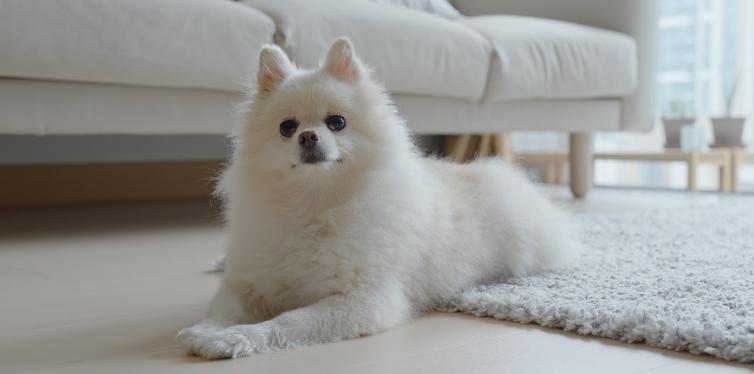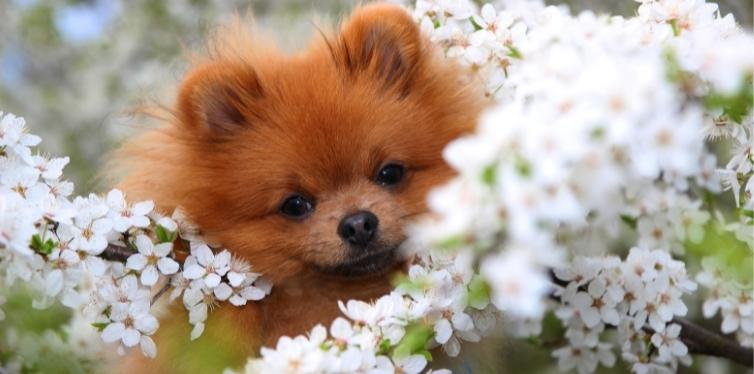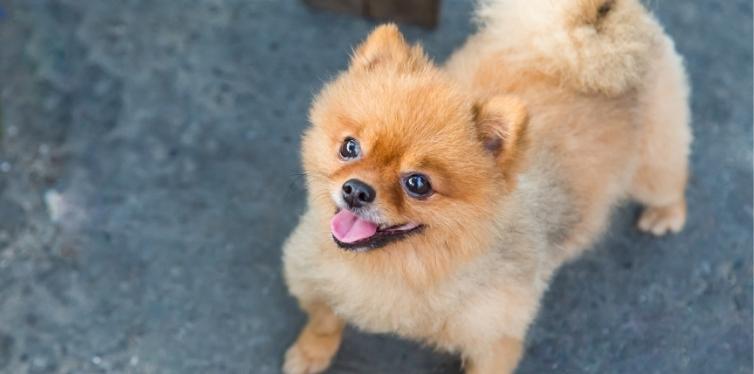I’ve noticed that every so often some of my Pomeranians start to cough or gag after they drink some water or swallow some food. At first, I thought they had the dog version of hairballs, but it turns out it’s a bit more serious than that.
So why do Pomeranians cough so much? The most common reason for a Pomeranian to cough regularly is due to them having a collapsed trachea, which is when the cartilage supporting their windpipe is degrading or damaged. Other reasons include Kennel Cough, allergies, and lung infections.
Watching a Pomeranian
Why Do Pomeranians Cough so Much
Whenever I start to see any of my Pomeranians coughing, gagging, or anything similar regularly, I instantly start to think about what could be the issue. When it comes to Pomeranians and other small breeds, it’s very common for it to be a collapsed trachea, but there are other Pomeranian breathing problems that can lead to these symptoms.
But be aware, whenever you see your dog coughing regularly (especially in a loud honking noise), gagging after drinking or eating, or breathing heavily, any of the following issues could be the reason.
A collapsed trachea is one of the most common Pomeranian health problems out there. As is the case with other small breeds, the cartilage around their windpipe can easily degrade over time causing the windpipe to collapse on itself. Thankfully, this isn’t a painful situation for our Pomeranians, but it is certainly an uncomfortable one.
One of the easiest ways to reduce the degradation of your Pomeranian’s windpipe cartilage is to use a no-pull dog harness instead of a collar when taking them out for walks. Collapsed tracheas are difficult to reverse, so preventing it from happening in the first place is of the utmost importance. Another useful remedy is high-quality cough medicine for dogs.
Pomeranians can also come down with a chronic cough when they catch the infamous Kennel Cough, which is a common, highly contagious respiratory disease. Don’t let the name fool you though. Your Pomeranian can get Kennel Cough without actually visiting the kennel. As a matter of fact, they can easily catch it by being around other dogs at the park, at home, at the groomers, at the vet, or any other place dogs get together.
Pomeranians are rather prone to allergies and can show up as a regular cough as opposed to Kennel Cough. Actually, if you ever hear your Pomeranian wheezing instead of coughing, it’s likely they’ve had some allergic reaction. Pomeranians can have various types of allergies, including skin allergies and food allergies, both of which can lead to coughing.
Food allergies are rather common among Pomeranians, so you might want to double-check which kinds of food your Pomeranian is eating and how they react to them. Being aware of what causes their allergic reactions is important for the overall health and lifespan of your Pomeranian.
It’s also possible that your Pomeranian has a worm infection, which can definitely kick off a coughing fit. This happened to Taco (now passed) when she was younger, so be aware that this could be the reason. If this is the case, most likely they’ll have heartworm or roundworm.
The difference is that heartworm is a very serious and potentially fatal disease that affects the heart and surrounding blood vessels in your Pomeranian, while the roundworm is a common parasitic worm that can be treated easily with various antibiotics.
With all of this information, it can seem overwhelming where to start when diagnosing your Pomeranian for their constant coughing or even an occasional cough. In any case, you need to set up an appointment with your local veterinarian once you start to notice your Pomeranian’s cough is not going away.
My Pomeranian Coughs with a Honking Sound

If your Pomeranian is coughing with a loud goose-like honking sound, they almost certainly have a collapsed trachea. Other signs your Pomeranian has a collapsed trachea is when they start to gag after they drink water or swallow some food. This is by far one of the most common health issues among Pomeranians and other small breeds, but, thankfully, it’s not one of the painful breathing problems. However, it may certainly be discomforting.
Treating a collapsed trachea is a tricky thing because once the cartilage around your Pomeranian’s windpipe’s been damaged, it’s difficult to restore it. Surgery can be an option, but it can cost anywhere between $2,000 and $5,000 and it’s likely not a fun recovery. Two of my Pomeranians, Rowdy and Elvis, have both had collapsed tracheas and we finally chose not to put them through surgery.
An alternative to surgery when addressing a collapsed trachea in dogs is to use a no-pull dog harness as opposed to a collar. This will ease up the pressure on your dog’s throat when they pull on the lease as hard as they do whenever on walks.
Along with that, there are also a lot of different kinds of cough suppressants for dogs with a collapsed trachea, which I’ve found to be incredibly effective. Some are for dog coughing in general while others are specifically targeting dogs with a
By combining the use of a no-pull dog harness and dog cough suppressants, Elvis and Rowdy cough far less than they once did. I suggest using both of these items for your Pomeranian because having a collapsed trachea is so common and usually shows up once they hit around six years old. Therefore, there’s plenty of time to prevent it from being too much of an issue if you start early.
What’s That Loud Nose Snorting Sound?

Have you ever noticed your Pomeranian having trouble breathing through their nose after getting really excited? Whether this happens after they “welcome” a guest into your home or just finished playing, if you see your Pomeranian making a strange sound while they attempt to breathe through their nose, they likely have an elongated palate. This is also known as reverse sneezing.
By far the most common symptom of an elongated palate is when a Pomeranian starts to snort loudly through their nose. While it’s not uncommon for people to think they’re just having another coughing fit, this is definitely not a Pomeranian coughing situation. What’s happening is the soft tissue located at the back of the roof of your Pomeranian’s mouth is too big and is blocking the entrance to their windpipe, which causes breathing issues and potentially coughing up white foam.
An elongated palate isn’t very common among Pomeranians as it’s more of an issue with pets that have short muzzles, like pugs, bulldogs, and even cats. However, my Pomeranian, Rowdy, definitely had it. After getting really excited, he’d always start making this super loud snorting sound, which we found out when we took him to the vet that it was the result of having an elongated palate.
Thankfully, this is a very treatable issue and can be fixed with a simple and safe surgery. Since this is a pretty common issue among other types of pets, the procedure can be quick and painless. If you notice your Pomeranian having loud nose snorting fits, you’ll want to take them to your local veterinarian immediately.
Stopping Pomeranian Coughing

Witnessing your Pomeranian suffer through incessant coughing can be difficult, so it’s only natural that you’d want to find a way to stop it. Being able to stop your Pomeranian from coughing is likely going to ease their discomfort, so it’s important to know what to do when confronted with such an issue.
Arguably the most common trigger for a Pomeranian coughing fit to start is after they’ve been very active and are overly excited. When this happens, they need to breathe more heavily causing whatever breathing problems they have to surface. Therefore, one of the most effective ways to stop them from coughing is to calm down your Pomeranian. For my Pomeranians with breathing problems, this is almost always the solution.
Another way to stop your Pomeranian from coughing so much is to regularly give them supplements that encourage a healthy respiratory system. These supplements can be in either liquid form or pill form and aren’t at all expensive. I walk through what I believe to be the best cough medicine for dogs, so if you’re Pomeranian is coughing you’ll want to take a look.
Apart from calming down your Pomeranian and giving them effective supplements, the best way to reduce your Pomeranian’s coughing fits is to get them a proper no-pull dog harness. Not only will it reduce the amount of coughing episodes by reducing pressure on your Pomeranian’s windpipe, but it’s also more comfortable for your Pomeranian.
Related Questions
Is a collapsed trachea painful for dogs? A collapsed trachea in dogs is not painful but is certainly uncomfortable. The lack of air they’re able to take in can cause mental discomfort while the simple fact they cannot
Can dogs die from tracheal collapse? Dogs cannot die from having a collapsed trachea. Even if the cartilage of your dog’s windpipe is almost entirely damaged, your dog will still be able to breathe, even if it’s uncomfortable.

